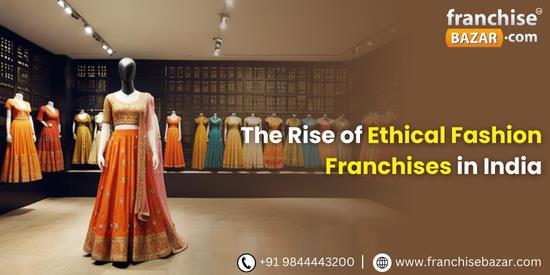Long-Term Business Model for 2025: The Rise of Ethical Fashion Franchises

Written By: Bandana Gupta
India is one of the world's top producers and has a long history in the textile industry.Millions of people are employed by the sector, which also makes a substantial economic contribution. Nonetheless, labour exploitation and environmental harm continue to be serious issues. Many franchise firms and entrepreneurs are focusing on ethical and eco-friendly production as a result of growing awareness of sustainable fashion, encouraging consumers to make responsible fashion choices.
Important Factors Influencing Sustainable Ethical Fashion's Franchise Future
- Consumer Demand: Conscious shoppers seek sustainable and ethical fashion, pushing brands to prioritise environmental and social responsibility.
- Sustainability Focus: The industry is shifting towards eco-friendly practices, with brands adapting their business models for a greener approach.
- Ethical Labour Practices: Consumers support brands that ensure fair wages, safe working conditions, and ethical labour standards.
- Circular Economy: Fashion is embracing recycling and upcycling to reduce waste and extend the lifespan of clothing.
- Traditional Techniques: Indian brands are reviving handloom and handicraft methods to create unique, high-quality, and sustainable fashion pieces. This transformation reflects a growing commitment to responsible and mindful fashion choices.
India's Main Obstacles to Sustainable Fashion
- Water Pollution: The textile industry is a major water consumer, contributing to 17-20% of industrial water pollution in India due to untreated waste discharge.
- Chemical Use: Harmful chemicals in dyes and finishes pollute water sources and pose health risks. India's cloth industry pollutes water more than any other industry.
- Waste Management: India generates around 16 million tons of textile waste annually, leading to landfill and waterway pollution.
- Exploitative Labour Practices: Many workers face low wages, long hours, and unsafe conditions, with child labour being a significant issue.
- Lack of Transparency: Many brands do not disclose sourcing and production details, making it hard for consumers to make ethical choices.
- Limited Consumer Awareness: Many buyers prioritise affordability over sustainability, making it difficult for ethical brands to compete.
- Shortage of Sustainable Materials: Limited local availability of eco-friendly fabrics makes sourcing expensive, especially for small businesses.
- High Production Costs: Fair salaries and eco-friendly materials make costs go up, which makes it tough for brands to compete with fast fashion.
- Lack of Government Support: No dedicated policies or initiatives exist to promote sustainable fashion, restricting funding and resources.
- Fast Fashion Culture: Consumers prefer low-cost, trendy clothing, making it hard for ethical brands to gain market traction.
These challenges highlight the urgent need for industry-wide reforms to promote sustainability and ethical practices in India's fashion sector.
Overcoming the challenges and implementing a solution for Ethical Fashion Franchise in India
- Use of Sustainable Materials: Brands are adopting eco-friendly fabrics like organic cotton, bamboo, and recycled polyester.
- Recycling and Upcycling: About 60% of India's textile waste is returned, and many fashion brands use recycled materials to make new clothes.
- Handloom and Handicrafts: Using traditional textile methods helps local artists and lessens the damage they do to the environment
- Ethical Labour Practices: The industry's social responsibility is enhanced by fair pay and secure working conditions.
- Use of Natural Dyes: Plant-based dyes minimise chemical pollution and health risks.
- Circular Fashion: Take-back programs and repair services help extend clothing lifecycles and reduce waste.
- Awareness Campaigns: NGOS and brands work together to inform customers about ethical fashion choices.
- Collaboration with Artisans: Partnering with artisans promotes unique, sustainable designs and strengthens local economies.
- Sustainable Packaging: Eco-friendly materials like recycled paper and biodegradable plastics help reduce waste.
- Government Initiatives: Initiatives such as Sustainable Fashion and Indian Textiles (SUIT) assist entrepreneurs with the creation of sustainable textiles. India's apparel industry is becoming more environmentally conscious and responsible as a result of these tactics.
Opportunities for the Sustainable Ethical Fashion Franchise Industry:
Innovation in materials, production, and distribution is being fueled by the growing demand for clothing made ethically and environmentally. Entrepreneurs are developing sustainable solutions that prioritise environmental responsibility and fair labour practices, shaping a more conscious fashion industry.
- Innovative Sustainable Materials: Eco-friendly materials such as milk proteins, banana fibers, and recycled PET bottles are available for entrepreneurs to investigate.
- Models of Circular Fashion: Initiatives for repairs, rental services, and take-backs cut waste and increase the lifespan of products.
- Ethical Fashion Marketplace: Platforms connect conscious consumers with sustainable brands, promoting responsible shopping.
- Zero-Waste Fashion: Repurposing textile waste helps create a circular economy and minimises environmental impact.
- Sustainable Manufacturing: Water conservation and the use of renewable energy promote environmentally friendly production
- Upcycling and customisation: Modifying existing products creates unique, sustainable fashion options.
- Local Sourcing and Production: Reducing carbon footprints while supporting communities strengthens sustainable fashion.
- Green Packaging: Biodegradable and compostable materials minimise environmental harm.
- Sustainable Supply Chain Management: Fair labour practices and low-emission processes promote ethical fashion.
- Education on Sustainable Fashion: Awareness campaigns inform customers and promote ethical fashion choices.
These chances enable businesspeople to create a more moral and sustainable fashion sector in India.
The Leading Indian Ethical Sustainable Fashion Franchise Brands:
1. Fabindia:
The biggest private marketplace for handcrafted goods in India, Fabindia connects rural craftspeople with urban consumers to support them.It promotes sustainable employment while preserving traditional craftsmanship. The company sells a range of contemporary, reasonably priced, natural, organic cotton-based, and craft-focused products.
2.No nasties:
Apurva Kothari founded the company in 2011 with the goal of being sustainable by utilizing only organic cotton, having a supply chain that is entirely local, and consuming less energy, water, and CO2. Through its investments in wind, solar, and reforestation projects, the brand triples the carbon footprint of its products.
Why Choose No Nasties?
- uses only organic cotton that hasn't been exposed to harmful pesticides.
- Avoids synthetic blends, making products fully biodegradable
- Offers stylish, minimalist designs perfect for everyday wear
3. Okhai:
Okhai gives rural craftsmen the tools and self-assurance they need to create handcrafted, ethical products utilizing age-old techniques. The brand prioritizes ethical and sustainable business operations along with unique embroidery and craftsmanship.Its vision ensures artisans have consistent work, promotes forgotten art forms, and enhances visibility for both the craft and its creators.
4. The Summer House:
The Summer House, started in 2015 by Shivangini Parihar and Rekha Datla, supports rural artisans and keeps traditional crafts alive. They work with artisans and local NGOS to help craft communities avoid unfair working conditions. The brand focuses on using sustainable fabrics like handwoven and organic materials, ECONYL regenerated nylon, and ethical Tencel, while always aiming for high environmental and ethical standards.
Why Choose The Summer House?
- Prioritises responsible sourcing and low-impact, eco-friendly materials
- Creates classic styles that stay fashionable and easy to wear, no matter the season.
5. Suta :
Suta blends tradition with modern fashion, creating beautifully designed clothing using age-old weaving methods mastered by skilled artisans. By honouring heritage while adding a fresh touch, the brand keeps timeless craftsmanship alive in today’s world.
6.11.11 – Handcrafted and Naturally Dyed:
11.11 embraces slow fashion by using traditional weaving and dyeing techniques, specialising in Khadi and handloom fabrics. The brand relies on natural dyes like indigo, pomegranate, and madder root, ensuring each piece is unique and biodegradable.
Why Choose 11.11?
- Dedicated to handloom craftsmanship and slow fashion
- Uses natural dyes like indigo, pomegranate, and turmeric for eco-friendly colouring
- Avoids synthetic fibres, helping reduce microplastic pollution and environmental impact
7. Ka-Sha – Upcycled and Artisanal Fashion:
Ka-Sha brings clothes to life by blending old and new crafting techniques, turning fashion into a way to express culture and creativity. Inspired by people, stories, and perspectives, each piece is crafted using indigenous textiles and surface treatments, creating wearable clothing that transcends borders while remaining rooted in India. Ka-Sha, focused on sustainability, created Heart To Haat—a project that gives new life to old materials by reusing, repurposing, and reclaiming them. Through upcycling, recycling, mending, and repairing textiles, Heart To Haat merges craft with innovation to minimise waste and give clothing a renewed purpose.
8. Reformation:
Reformation integrates sustainability into its operations by minimising waste, water, and energy consumption through green building investments. To maintain transparency, Reformation compiles this data into quarterly consumer reports, reinforcing its commitment to responsible business practices.
9. Pact :
Pact Group integrates sustainability into its operations, acknowledging its direct impact on stakeholders and communities. Since 2002, it has been a leader in the circular economy, pioneering sustainable packaging through recyclable and reusable solutions.
10. People Tree:
Since its founding in 1991, People Tree has been a pioneer in sustainably, consistently prioritising environmental responsibility. Over the past three decades, the company has upheld its mission of reliability and ethical consistency, ensuring that every product meets the highest environmental and ethical standards throughout its lifecycle.
Conclusion
The ethical fashion franchise industry, while globally influential, has significant environmental and social impacts. As a key player in textile and clothing manufacturing, India faces both obstacles and opportunities in advancing sustainable practices, contributing to a global movement toward environmentally conscious fashion.
Disclaimer: The brands mentioned in this blog are the recommendations provided by the author. FranchiseBAZAR does not claim to work with these brands / represent them / or are associated with them in any manner. Investors and prospective franchisees are to do their own due diligence before investing in any franchise business at their own risk and discretion. FranchiseBAZAR or its Directors disclaim any liability or risks arising out of any transactions that may take place due to the information provided in this blog.
Recent Blogs

Written By: Khushboo Verma
For over thirty years,...

Written By: Harsh Vardhan Singh
India’s...

Written By: Gouri Ghosh
Indian families may...

Written By: Bandana Gupta
India in 2026 finds...
Why Should I Register?
You are seeking to access information which is provided only to registered members. It takes less than a minute to register and access information on FRANCHISEBAZAR.